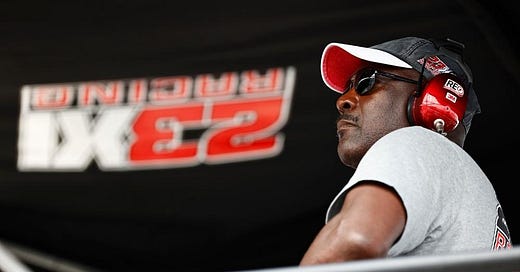Michael Jordan’s NASCAR Team Is in a Legal War With the Sport
As 23XI fights to keep its charter, the battle has spiralled into countersuits, financial threats, and a power struggle over NASCAR’s future.
For all the myth-making around Michael Jordan’s winning DNA, the reality of owning a sports team in 2025 is less highlight reel and more courtroom slog.
This month, the greatest basketball player of all time (yeah, I said it) recently lost a major off-track fight. His 23XI Racing team is now at risk of losing its NASCAR charter, and the legal battle behind the scenes is growing nastier by the week.
On 5 June, the U.S. Court of Appeals for the 4th Circuit vacated a preliminary injunction that had protected 23XI and Front Row Motorsports from charter removal.
That ruling overturned a December order requiring NASCAR to treat both teams as fully chartered for the 2025 Cup Series season. Without that protection, they face the possibility of being stripped of guaranteed race entries and prize money.
But that was just the opening salvo. Since then, the legal pressure has intensified. On 20 June, the teams filed a formal request for an en banc rehearing before the full Fourth Circuit bench. That move pauses the risk of immediate charter loss.
Until the rehearing is either denied or ruled upon, both 23XI and Front Row remain officially chartered. A seven-day grace period would follow any denial, meaning the next inflexion point will not come before July.
Still, the clock is ticking. NASCAR’s legal team has shown no signs of relenting. In fact, they have now gone on the offensive. A federal judge has ruled that NASCAR’s countersuit can proceed, which alleges that 23XI co-owner Curtis Polk engaged in cartel-like behaviour during failed charter negotiations.
It is a bold escalation from the governing body. NASCAR is not just defending its structure. It is accusing Jordan’s team of trying to manipulate it.
Behind closed doors, the pressure is mounting elsewhere too. This week in Charlotte, NASCAR demanded more than a decade of detailed financial data from the 15 Cup Series teams still backing the lawsuit. That includes salary structures, sponsorship revenue, and internal financial planning.
Attorneys representing the teams warned that even redacted disclosures would be “catastrophic,” as rival organisations would gain insight into confidential competitive strategies. Judge Kenneth Bell appeared unconvinced, asking why the teams had not offered NFL-style “topline summaries” instead of refusing altogether.
Follow me for more sports and life updates: Instagram
What started as a challenge to a revenue model is morphing into a high-stakes showdown that could pry open the financial soul of the sport. And it is all happening while the 2025 season is in full swing.
Tyler Reddick, 23XI’s lead driver, currently sits sixth in the Cup Series standings. Bubba Wallace is in twelfth. These are not backmarkers. They are central figures in the championship picture. Yet their team is navigating weekly race prep under the looming threat of serious business impact.
At the heart of this saga is NASCAR’s charter system. Introduced in 2016, it was designed to provide financial stability and structure for teams by guaranteeing race entries and revenue shares. Unlike the NBA or NFL, however, NASCAR charters are not true franchises. The sanctioning body retains ultimate control and can revoke or deny renewals. That centralised authority is what Jordan’s team and others have called monopolistic.
Back in October 2024, 23XI and Front Row filed a lawsuit accusing NASCAR of operating like a cartel, using the charter model to enforce loyalty and suppress dissent.
The France family, who controls the organisation, were labelled “monopolistic bullies” in the filing. The teams argued that they deserve a larger and more transparent share of NASCAR’s media revenue, especially given their role in growing the sport’s visibility.
Michael Jordan’s involvement has been more than a branding play. His team represents a modern approach to motorsport ownership. Jordan brought in new fans, fresh commercial partners, and a sense of cultural relevance that NASCAR has struggled to cultivate on its own.
NASCAR’s lawyers, for their part, remain dismissive. In March, one stated in court that the teams had never clearly articulated what they believed a “fair revenue split” would even look like. That posture has not changed.
Their legal strategy now centres on flipping the narrative: portraying Jordan’s group not as underdogs, but as disruptive figures trying to seize structural control without offering constructive solutions.
Despite the setbacks, 23XI remains publicly defiant. Denny Hamlin (driver for Joe Gibbs Racing and the co-owner of 23XI Racing) recently told the Associated Press that he is “unfazed” by the ruling and that the panel decision represents just “one part of a larger case.”
But with NASCAR’s countersuit in motion and the teams being pushed to reveal years of financial data, the next few months could become less about race results and more about institutional survival.
This is no longer just a legal row over prize money. It is a battle over how NASCAR is run, who gets to influence its future, and whether innovation and equity have any place in its business model.
The trial is still set for December. But between now and then, the cost of fighting the old system may keep rising. And if the sport loses someone like Jordan in the process, it is not just his team that walks away empty-handed. It is NASCAR that will have missed the bigger opportunity.
Thanks for reading, David Skilling.
Follow me on LinkedIn | X | Instagram
If you hit the like button, you’ll be doing me a huge favour, and if your business needs sports writing, wants to discuss advertising, or you have PR stories to pitch, feel free to get in contact.
If you know someone who will enjoy this article, please share it with them.




